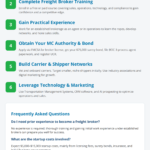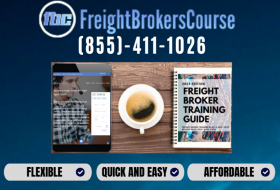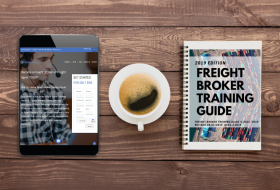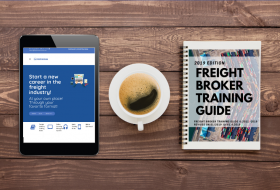🚚 How to Become a Freight Broker with No Experience: Quick Overview
- Breaking into freight brokerage requires no prior experience—just dedication, training, and proper licensing
- Complete journey takes 60-90 days for licensing, 6-12 months to build a client base
- Total startup costs range from $5,000-$15,000, with surety bond being the largest expense
- Learn fundamentals through free resources, gain experience working for established brokerages, then launch independently
- The U.S. freight market exceeds $200 billion—massive opportunity for motivated newcomers
How to Become a Freight Broker with No Experience
Your complete 2025 roadmap to launching a profitable freight brokerage career—even if you’re starting from scratch. This guide covers training, licensing, networking, and proven strategies that work for absolute beginners who want free freight broker training and a successful start.
Understanding the Freight Broker Role
Freight brokers facilitate connections between shippers and carriers. Learning how to become a freight broker with no experience starts with understanding this intermediary role. Brokers coordinate shipments, negotiate rates, and ensure logistics run smoothly without owning trucks or freight themselves. Gaining comprehensive free freight broker training helps you start confidently in this critical role in the supply chain.[web:4][web:23]
Step 1: Free Freight Broker Training and Industry Fundamentals
Getting quality free freight broker training is the foundation of how to become a freight broker with no experience. Learn about freight classes, transportation modes, load types, and industry terms. Use free resources like reputable YouTube channels, industry forums, and online courses to build your knowledge without upfront cost.[web:7]
Key Topics in Free Freight Broker Training
- FMCSA regulations and freight broker license requirements
- Pricing and rate structures across freight lanes and seasons
- Transportation Management Systems (TMS) essentials and load board utilization
- Carrier safety and insurance verification—critical for broker credibility
Step 2: Gain Freight Broker Training with No Experience
Free freight broker training programs are crucial for understanding operations, compliance, and sales. Choose a reputable free training platform or tutorial series to learn all logistics essentials and brokerage workflows—even with no experience.[web:25][web:29]
Programs such as our no-cost freight broker startup course provide stepwise guidance that new entrants need.
Step 3: Gain Practical Experience Before Starting
The best way on how to become a freight broker with no experience is gaining hands-on experience. Work as a freight agent or dispatcher with an established brokerage. This provides paid training, mentorship, and vital market exposure, improving your chances of success once you start your own brokerage.[web:2][web:8]
Work allows you to learn about carrier relationships, lead generation, route planning, and freight matching first-hand while being financially supported.
Step 4: Obtain Your Freight Broker Authority
To legally operate, apply for your MC authority from the FMCSA, secure your surety bond, and complete necessary filings (BOC-3, UCR). This process is a core part of how to become a freight broker with no experience, and training will prepare you to navigate all steps efficiently.[attached_file:1]
Licensing & Bonding Costs
Step 5: Build Your Carrier Network
Once licensed, building strong carrier relationships is essential. Vet carriers carefully—verify their insurance, registrations, and safety records. Use load boards (like FindFreightLoads.com) for a free trial to locate carriers and freight matching opportunities.[web:4]
Step 6: Develop Your Shipper Client Base
Find shippers by networking, digital marketing, and leveraging industry associations. Smaller or niche shippers often welcome new brokers. Use cost-effective marketing and personal outreach to demonstrate your value.[web:23]
Step 7: Use Technology to Your Advantage
Modern freight brokers use TMS software to automate load matching, carrier management, and shipment tracking. Tools like DAT load boards, CRM platforms, and cloud phone systems improve efficiency and professionalism.[web:25]
FAQs – How to Become a Freight Broker with No Experience
- Is free freight broker training effective for beginners?
- Yes, free freight broker training provides all foundational knowledge necessary if you follow it diligently and supplement with practical experience.
- How do I apply for a freight broker license?
- Apply for MC authority with FMCSA, secure your surety bond, file BOC-3, and register for UCR. Detailed steps are in our license requirements guide.
- Can I start as a freight agent instead?
- Yes, working as a freight agent under an established broker is a common pathway with minimal startup costs.
- How much money can I make as a new broker?
- In early years expect $30K-$50K annually while building your network; with experience, incomes $60K–$100K+ are typical.








